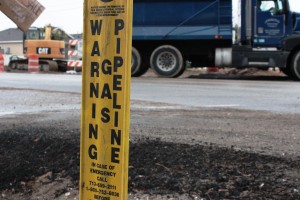Call Before You Dig: Does Texas Put Pipelines at Risk?

Dave Fehling / StateImpact
Temporary sign marks where gas pipeline is buried along road under construction in Harris County
The U.S. Department of Transportation gave grants totaling $1.5 million last year to states for safety programs aimed at reducing damage to pipelines.
Twenty states qualified. But not Texas.
Texas has by far the most miles of natural gas pipelines and is the state with the most accidents. But according to federal pipeline regulators, Texas also grants the most exemptions (along with Florida) regarding who must notify a pipeline or utility company before digging.
Federal data show that in the past decade, 11 percent of serious pipeline accidents in Texas were caused by work crews doing excavations. According to CenterPoint Energy, a Houston comnpany that distributes natural gas to over 3 million customers in Texas and other states, over half the damage to its pipelines last year was “caused by an excavator failing to Call 811.”
Not Everyone Who Digs Has to Call
Call 811 is the call center that construction crews can contact before they dig to find out where pipelines are located. The pipeline company then marks the lines so operators of backhoes and other construction equipment will steer clear. But the process can take a couple days so calling 811 can be seen as one more way to delay a construction job.
In a report last year, a pipeline industry group, Common Ground Alliance, said federal data suggested that the more exemptions a state granted to exactly who has to call, the more damaged pipelines the state suffered.
Who does Texas exempt? Topping the list are gravediggers. But also on it are railroad maintenance crews, oil and gas drillers, farmers, and county and state road crews.
It’s that last exemption for local and state governments that disqualified Texas from receiving federal funds according to a letter from the Pipeline and Hazardous Materials Safety Administration. The letter was in response to questions from State Representative Tony Dale, a Republican from Cedar Park near Austin.
“Now that doesn’t mean counties don’t call before they dig, many of them do,” said Rep. Dale. His efforts to limit the exemptions didn’t make it through the last legislative session. He said some county governments were opposed to losing their exemption.
But not surprisingly, Rep. Dale got support from pipeline companies.
Charles Yarbrough, an executive with Atmos Pipeline, said hardly a day goes by without someone damaging one of the company’s lines. Yarbrough also chairs the safety committee for the Texas Pipeline Association.
“The association feels like the exemptions should be eliminated or certainly significantly pared back at a minimum. Because it’s really a safety issue. It’s a safety issue for people doing the excavation, their equipment, and the public in general who can potentially be harmed by not making the call,” Yarbrough told StateImpact.
Texas Pipeline Regulator Issues Thousands of Citations
But it’s not like Texas currently does nothing to promote the 8-1-1 program.
The Railroad Commission of Texas that regulates pipelines said it enforces the Federal Pipeline Safety Statue which the commission said requires just about everybody to call before digging.
“There are no statutory exemptions for state and municipal entities which the Commission has cited for violations of the Commission’s underground pipeline damage prevention rules numerous times since these rules went into effect September 1, 2007,” said Railroad Commission spokesperson, Ramona Nye, in an email to StateImpact.
In the past five years, the commission said it has issued more than 3,000 violation citations to state and local governments that did work on construction projects without first calling before they dug.
Charles Yarbrough, the pipeline executive, praised the commission’s efforts but said Texas still needs to change its 811 “One Call” law.
“The real solution is going to have to wait till the One Call law is changed (to) eliminate the exemption for making the call that gets it all started.”

